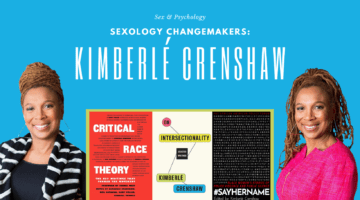When Women Get Blamed For Men’s Infidelity
July 17, 2019 by Justin Lehmiller
Three Women is a bestselling new book on sexual desire written by journalist Lisa Taddeo. It offers a deep dive into the sex lives and relationships of three American women who live in different parts of the country.
These women include Maggie, who has a sexual relationship with one of her teachers in high school that devastates her psychologically. Then there’s Lina, who is in a passionless relationship with her husband (he hasn’t kissed her in ten years) that prompts her to seek out an affair with her high school crush. Finally, we have Sloane, who has an active sex life with her husband, yet she has sex with other men, and sometimes with women, while her husband watches.
I recently interviewed Taddeo about Three Women and am sharing some of the highlights from our discussion in a series of posts (you can read my first post here, which focuses on Sloane’s relationship and the psychology of cuckolding). Today, we’re going to explore infidelity and the different ways that it affects men and women.
A excerpt from my conversation with Taddeo appears below, which has been lightly edited for clarity.
__
Justin Lehmiller: Something I noticed in reading your book was that at the core of all of your stories, there were threads of secrecy and infidelity. In each of the stories, you see women who are having sex with men who are married, and those men are committing infidelity. With Sloane, one of the men she has sex with while her husband (Richard) watches is Wes, and Wes is cheating on his spouse. In the case of Maggie, who has a sexual relationship with her high school teacher, the teacher is married and cheating on his spouse. And in the case of Lina, who is in this sort of passionless relationship, she’s having sex with Aiden, her high school crush, who I believe is also married and committing infidelity.
So, they’re all in sexual relationships with men who are married to other women and they’re sneaking around to do it. So what kind of impact did all of this secrecy and infidelity have on these women? What can you tell us about that?
Lisa Taddeo: A lot of people have been like, “Why did you focus on infidelity?” However, I wasn’t intentionally trying to focus on infidelity. Esther Perel has argued that women, when they begin to feel safety in a relationship, they seek to move outside of it more.
I found that across so many of the people that I spoke to—men and women–there were so many thoughts of infidelity, and they were afraid of these thoughts coming out into the open. For me, I just found infidelity to just be rampant—not just the actual act, but also the wanting to do it and then those people wanting to talk about it.
With Maggie, the infidelity was not Maggie’s. With Lina, it was. And with Sloane [who was sleeping with other men while her husband watched], the infidelity belonged to another man, Wes. Sloane and her husband did not experience it.
Regardless of who commits the infidelity, I think it has a huge impact, and that the impact is on women predominantly. What happens in Sloane’s narrative is that when Wes’s partner finds out about his infidelity, Sloane is the one who is hated, even though it was Richard [Sloane’s husband] who really wanted it. And Sloane’s best friend says, “You need to go over there and tell that woman that it wasn’t you.” Sloane was protecting both the men in her life. I think the impact that infidelity has on women is wild and I think that whether a man cheats on them or they cheat on a man, it’s different.
I think that the heterosexual men—and I’m just generalizing here, and I hate the generalize—but from what I saw across the two genders, a lot of men were kind of brushing it off. And if it ruined their lives in a sense, they were upset. But women did not compartmentalize it in the same way. If infidelity showed itself in women’s lives, it was kind of intermixed with their career and their children and just everything, whereas men were like, “Okay, I need to now clean this up.” I think it just has a huge emotional toll across the board for women.
Justin Lehmiller: That’s so interesting. And now I’m thinking back to my dissertation research from graduate school. I was studying secret relationships and part of what I looked at was people who were committing infidelity. I went to some infidelity discussion boards online and I was listening to what people had to say. You could really understand that heavy emotional impact that infidelity was having on them; however, I didn’t look specifically at the gendered nature of some of those effects and in particular how men’s infidelity often becomes a woman’s problem.
That’s a really interesting dynamic there, and it’s more evidence that there’s a sexual double standard, or the idea that women are judged more harshly than men when they don’t do what’s expected of them when it comes to sex. With sexual desire in particular, many people are uncomfortable with a woman wanting sex, unless it’s in the context of a heterosexual, monogamous marriage. It seems like that’s a point that you really wanted to hone in on, that women’s desire is often constrained by societal and cultural forces. Is that an accurate characterization?
Lisa Taddeo: Yes, with one caveat. The way that I got into Sloane wasn’t even the rumors about her having sex with other men while her husband watched. With Sloane, the first thing that I heard about her was that her husband wanted to have sex with her every day. Part two was that she allowed it. Part three was that she wanted to.
The sort of wide-eyed shock with which that was conveyed, as well as the repudiation, was completely horrifying and fascinating to me, that people would sort of find that disturbing. And it wasn’t people, but specifically other women. Heterosexual men were sort of like, “Whatever, that’s cool.” But other women, it almost made them afraid in a sense that there are people out there who were doing this. It’s one thing to not want to have sex with your husband everyday in your own marriage, or even once a week or once a month, or whatever it is. That’s a personal choice. But what I found interesting was the way a woman could be mocked for wanting to have sex with her husband often, which is in fact, and correct me if I’m wrong, but it is considered a very healthy thing to do.
Stay tuned for more from my conversation with Lisa Taddeo and be sure to check out her book Three Women.
Want to learn more about Sex and Psychology ? Click here for previous articles or follow the blog on Facebook (facebook.com/psychologyofsex), Twitter (@JustinLehmiller), or Reddit (reddit.com/r/psychologyofsex) to receive updates. You can also follow Dr. Lehmiller on YouTube and Instagram.
Image Source: 123RF
You Might Also Like:

Dr. Justin Lehmiller
Founder & Owner of Sex and PsychologyDr. Justin Lehmiller is a social psychologist and Research Fellow at The Kinsey Institute. He runs the Sex and Psychology blog and podcast and is author of the popular book Tell Me What You Want. Dr. Lehmiller is an award-winning educator, and a prolific researcher who has published more than 50 academic works.
Read full bio >


